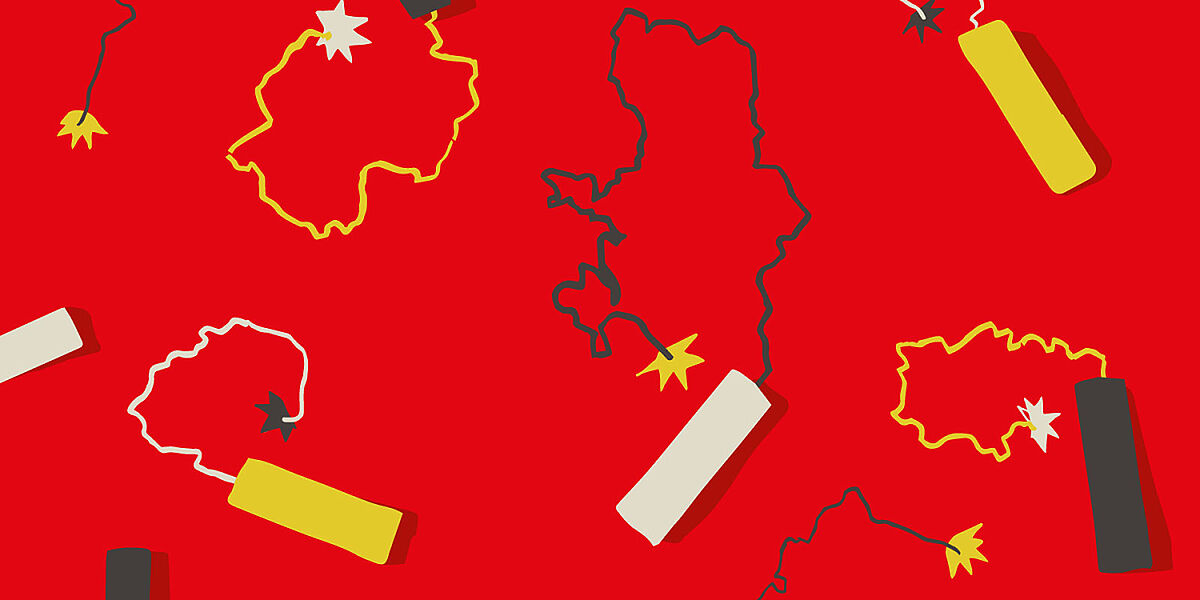Press release Security Radar 2019: Wake-up call for Europe!

Germans name the USA and Russia as threats to European security
This is one of the results of a representative public opinion poll “Security Radar 2019 – Wake-Up Call for Europe” of the Vienna-based FES Regional Office for Cooperation and Peace in Europe, to be presented at the Munich Security Conference. The poll was conducted in cooperation with the opinion research institute Ipsos in seven countries: Germany, France, Latvia, Poland, Russia, Serbia and Ukraine. The respondents perceive wars and conflicts as the biggest threat to European security, with 69% on average fearing that their own country could be affected. Half of the Germans fear future wars could affect their country; one in four expects a new war in Europe against the background of Russia-West tensions.
USA and Russia are security threats
Half of the German respondents think that the USA is a threat to security in Europe, well ahead of any threat posed by Russia (33%). Even NATO enlargement (50%) and EU enlargement (41%) are viewed as greater threats to European security. Conversely, in Poland and Ukraine Russia is clearly perceived as a threat (77% and 67% respectively), less so in France (40%) and Serbia (23%).
Many European states dissatisfied with their status
Discontent with one’s international standing is a big challenge to security in Europe. In particular Serbian, Ukrainian and Polish respondents (85%, 74% and 67% respectively) think their countries do not have the status they deserve, while the Germans and the French are satisfied with their countries’ respective status (71%, 59%). Additionally, Serbian and Russian respondents believe that other states actively prevent their countries from achieving true greatness (75%, 69%). This implies endorsement of increased military spending – particularly in Serbia, Poland and Ukraine (77%, 68%, 61%). Only 43% of the Germans polled are in favour of such policy.
Among factors influencing the relations with Russia respondents cite the Ukraine crisis (72%) and the USA (68%). Notably, here Polish and German attitudes do not differ much. A lack of cooperation with Russia is another factor - 69% of all respondents name it. Remarkably, Latvia and Poland poll higher than this average, whereas Germany - lower. More than half of all respondents desire greater cooperation with Russia – as do even 27% of the Ukrainians.
Ukrainians want to solve the conflict themselves
Remarkably, 63% of Ukrainians believe that the solution to the crisis in and around Ukraine should be left to Ukraine. NATO membership is desired by 56% of Ukrainians (in Germany: 23%), while 73% wish to join the EU (in Germany: 26%).
Inclusive and non-military organisations should play a more important role in the future.
Respondents want the EU to play a greater role in the future, citing it after the United Nation (UN) and just before the Organisation for Security and Co-operation in Europe (OSCE). On average 60% opt for a value-based foreign policy; only in Russia and Serbia are the numbers considerably lower. It is exactly the other way around regarding an interest-based foreign policy: Germany and France poll below the average of 77%. 70% of Germans want their country to pursue an active foreign policy and play a significant role in solving international problems. Asked about assuming more international responsibility and supporting other states, even with no direct benefit for their own country, Germans poll highest, much above the average, followed by France and Poland. Russian respondents show no interest in such a foreign policy.
No new East-West conflict
Unlike in the Cold War, with two major blocks ideologically opposed to one another, the current tensions in Europe hardly fit this pattern. Instead, the polled countries can be classified into three groups. Germany and France both want to assume more responsibility, are not viewed as triggers of the current crisis and are content with their international standing. They are capable to lead a joint effort for an inclusive European security.
By contrast, Russia is considered a challenge for European security. The population is discontent with the status of the country and wishes for a purely interest-based foreign policy. At the same time, it feels itself as part of the European cultural sphere.
The four countries of Latvia, Poland, Serbia and Ukraine share a dissatisfaction with their respective status. However, the wishes and interest of the population do not neatly correspond with either of the other two country groups. These four countries are moving between East and West. For a joint European foreign policy, this entails a challenge, but first and foremost a transformative potential.
Methodology: Multi-Country CATI-Survey
Countries: Germany, France, Latvia, Poland, Russia, Ukraine, Serbia
Mode: Computer Assisted Telephone Interviewing (CATI)
Sampling: Random sampling, representative for the population of the country
Target group: Resident population aged 18+ that lives in a private household and is attainable via landline and / or mobile telephone connection
Interviews: n=1,000 interviews in each country, 7,000 in total
Weighting: The sample structure of the reported results is adjusted to the official statistics (weighting based on age, gender and region)
Fieldwork: August-October 2018
Contact at FES Regional Office for Cooperation and Peace in Europe
Dr. Reinhard Krumm, Head
+43 (0)664 284 45 14
reinhard.krumm@fes-vienna.org
More about the Security Radar 2019:
www.security-radar.eu

